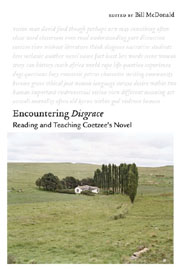Book contents
- Frontmatter
- Contents
- Acknowledgments
- Introduction
- I Reading Disgrace
- II Reading Disgrace with Others
- 11 Community Reading: Teaching Disgrace in an Alternative College Classroom
- 12 Out of the Father's House into a Community of Readers
- 13 Sympathy for the Devil: On the Perversity of Teaching Disgrace
- 14 Teaching Disgrace in the Large Lecture Classroom
- 15 Discussing Disgrace in a Critical Theory Class
- 16 Disgrace in the Classroom: A Tale of Two Teaching Strategies
- 17 The Bodies of Others: A Meditation on the Environs of Reading J. M. Coetzee's Disgrace and Caryl Phillips's The Nature of Blood
- 18 Disgrace as a Teacher
- Works Cited
- Notes on the Contributors
- Index
15 - Discussing Disgrace in a Critical Theory Class
from II - Reading Disgrace with Others
Published online by Cambridge University Press: 12 September 2012
- Frontmatter
- Contents
- Acknowledgments
- Introduction
- I Reading Disgrace
- II Reading Disgrace with Others
- 11 Community Reading: Teaching Disgrace in an Alternative College Classroom
- 12 Out of the Father's House into a Community of Readers
- 13 Sympathy for the Devil: On the Perversity of Teaching Disgrace
- 14 Teaching Disgrace in the Large Lecture Classroom
- 15 Discussing Disgrace in a Critical Theory Class
- 16 Disgrace in the Classroom: A Tale of Two Teaching Strategies
- 17 The Bodies of Others: A Meditation on the Environs of Reading J. M. Coetzee's Disgrace and Caryl Phillips's The Nature of Blood
- 18 Disgrace as a Teacher
- Works Cited
- Notes on the Contributors
- Index
Summary
Whenever I teach “ENG 355: Critical Theory” here at the University of Wisconsin-La Crosse, there are at least a few students who dare to ask what “all this” has to do with literature, or even English. My usual reply is that while their question is perfectly understandable, while what we are reading is technically called twentieth-century philosophy, not literature, not literary criticism even, its relevance is nonetheless manifold. Theory is transportable, I tell them; you can take it anywhere and use it to contextualize an inquiry or a debate about anything, and for literature majors, that thing is literature. This year, for the first time, I decided to put literature to the test by assigning J. M. Coetzee's Disgrace for our last class and using it as a sort of case study, something to compare our theorists to. I told my students on the first day that a group of “unsolitary readers” from my alma mater had asked me to teach the book and then write about the experience. I told them that on our last class meeting (we met once a week for three hours), the following questions would be at issue: “What would Disgrace and its characters have to say to these theorists, and how would the theorists reply? What would Coetzee say if he were a theorist? What would you say?” Little did I know at that time that such questions — “What would (blank) say?” — would be problematized in a way that might have served as the beginning for a whole new course called “Critical Theory and The Novel.”
- Type
- Chapter
- Information
- Encountering 'Disgrace'Reading and Teaching Coetzee's Novel, pp. 288 - 296Publisher: Boydell & BrewerPrint publication year: 2009



